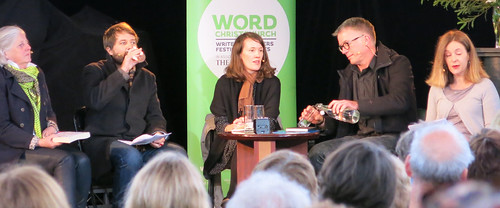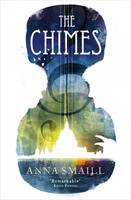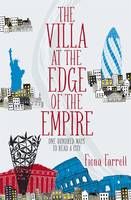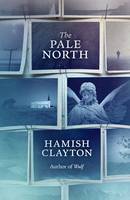Shifting points of view is WORD Christchurch's season of brain-tickling talks at the Christchurch Arts Festival (Peter Singer and Sarah Waters on Monday 7 September yo!). A podcast of this WORD Christchurch event was recorded.
I arrived (just) in time on a nippy Sunday for Imaginary Cities. It featured the super-intelligent powers of authors Fiona Farrell, Anna Smaill, Hamish Clayton, and Christchurch City Council designer Hugh Nicholson, and a stellar chairperson in the form of Christchurch Art Gallery Senior Curator Lara Strongman.
The topic:
Taking the Christchurch blueprint as a starting point, this panel will look at ways in which we imagine cities, either in fiction, in history, or in contemporary life; whether as utopias or dystopias, cities imagined or reimagined.

Imaginary Cities panel Flickr 2015-08-30-IMG_8942
Blimey. I can only hint at the brilliant barrage of words and ideas we were treated to.
 Man Booker Prize nominated Anna Smaill - author of The Chimes - complained of jetlag, but was like intellectual quicksilver. She spoke of cities as places of amassed energy, and how we have only a "narrow toehold" on civilisation. In a city, the natural world is forever leaning over our shoulder.
Man Booker Prize nominated Anna Smaill - author of The Chimes - complained of jetlag, but was like intellectual quicksilver. She spoke of cities as places of amassed energy, and how we have only a "narrow toehold" on civilisation. In a city, the natural world is forever leaning over our shoulder.
Hamish talked about the city as a "morbid playground", and a place that allows us to escape into anonymity. (Especially good for these introverted writerly types).
Designer Hugh Nicholson spoke about the imposition of the imaginary on the real:
Street patterns stay in the city for a very long time.
 Fiona read The Flyover of Hope from her new book The Villa at the Edge of the Empire: One Hundred Ways to Read a City (read that extract, and Press writer Philip Matthew's most excellent interview):
Fiona read The Flyover of Hope from her new book The Villa at the Edge of the Empire: One Hundred Ways to Read a City (read that extract, and Press writer Philip Matthew's most excellent interview):
A couple spin by on a tandem, a white boy on the front, a brown girl behind, both pedalling unsteadily through green trees, both laughing with delight at the prospect of their opportunity. Earthquakes have destroyed their beautiful city, 70 per cent of its major buildings have been or are about to be demolished. But 106,000 of the city's residents have risen to the call! They have submitted their vision for a new city and here is the synthesis of their dreams, a "flyover of their hopes".
Fiona loved maps since reading Milly Molly Mandy as a kid. She spoke of Hippodamian grids - "a quick way of slapping down a city on a frontier" and the motivation to citybuild as encompassing politics, power, and the impulse to profit.
The one map we never see is where we are always coming ashore, looking for something.
How do fiction and memory fit into this? The city is a time machine. Hamish sees fiction as an engagement with an imagined remembered place. And every NZ writer is dealing with a relationship to place. Anna said that in fiction, you are inheriting the physical remains and stitching them back into a narrative. Fiction can help us understand cities better, said Hugh. Fiona spoke of the power of the novel to comfort, and proposed that the humanities are well named.
 The writers spoke about the city in their books. Hamish set The Pale North in a fictional Wellington, and had to think deeply about ethical engagement after Christchurch's quakes.
The writers spoke about the city in their books. Hamish set The Pale North in a fictional Wellington, and had to think deeply about ethical engagement after Christchurch's quakes.
Fiction is a hell of a machine when things go wrong.
Fiona read a lot - including Seneca on earthquakes, and used that research as "a rich mass of compost" on which to build. Her next book is a novel that will sit with The Villa as its fictional counterpart.
The dystopian London in Anna's book The Chimes was born of sensory impressions, and one of the books she mentioned was Peter Ackroyd's psychogeography about the Thames. The other great influence in her hybrid of fantasy and mythic elements was Russell Hoban's Riddley Walker (an amazing book that). She quoted Conrad:
“And this also,” said Marlow suddenly, “has been one of the dark places of the earth.” (Heart of Darkness, Joseph Conrad)
Fiona spoke of the new doco The Art of Recovery and how it showed little shoots of hope and energy:
"I find great poignancy & loveliness in our constant attempt to make life better." Fiona Farrell. #wordchch #chchfest2015 ^DR
— Ngā Kete Wānanga o Ōtautahi (@ChristchurchLib) August 30, 2015
A profound session then, and it ended with Lara asking for more "public imagination" in Christchurch.
Quotable quotes
"Every city has the potential to be a Utopia". @AnnaESmaill talking at Imaginary Cities panel.#wordchch #chchartsfest2015
— Ngā Kete Wānanga o Ōtautahi (@ChristchurchLib) August 30, 2015
"The imaginary umbilical cord of Riccarton". @AnnaESmaill on living in #chch. #wordchch #chchartsfest2015 ^DR
— Ngā Kete Wānanga o Ōtautahi (@ChristchurchLib) August 30, 2015
Wellington still a cool place, but risk of self satisfaction says Hamish Clayton. #wordchch #chchfest2015 ^DR
— Ngā Kete Wānanga o Ōtautahi (@ChristchurchLib) August 30, 2015
"Design is a partnership between imagination and rationality." Hugh Nicholson. #wordchch #chchfest2015 ^DR
— Ngā Kete Wānanga o Ōtautahi (@ChristchurchLib) August 30, 2015
"Christchurch is a special case. It's change on speed." Hugh Nicholson. #wordchch #chchfest2015 ^DR
— Ngā Kete Wānanga o Ōtautahi (@ChristchurchLib) August 30, 2015
A smattering of laughter at the somewhat sarcastic delivery of Fiona Farrell describing the city of our 100 day plan. ^MT #chchfest2015
— Ngā Kete Wānanga o Ōtautahi (@ChristchurchLib) August 30, 2015
"We have all got the potential to forget. I think Janet Frame is the Laureate of that concern." @AnnaESmaill #wordchch #chchfest2015 ^DR
— Ngā Kete Wānanga o Ōtautahi (@ChristchurchLib) August 30, 2015
"To conceive of a new way of building a city requires imagination." Hugh Nicholson. #wordchch #chchfest2015 ^DR
— Ngā Kete Wānanga o Ōtautahi (@ChristchurchLib) August 30, 2015
Find works in our catalogue by:
More reading:
- Quick questions with Anna Smaill
- Masha's interview with Anna Smaill
- Read our Shifting Points of View sessions blog posts
The Villa at the Edge of the Empire


Add a comment to: Imaginary Cities